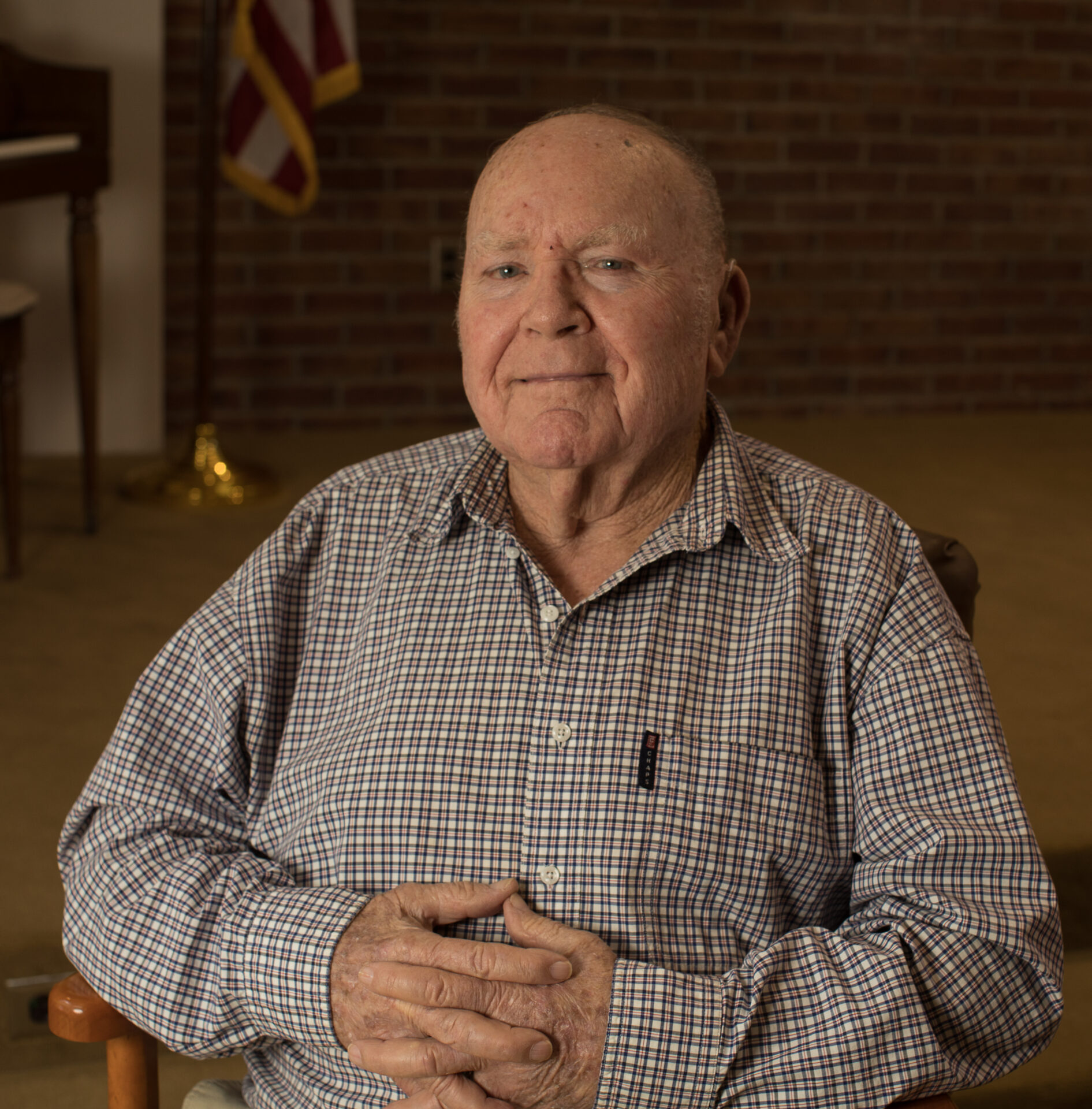Extras News
Mississippi Veteran Feature: Warner Webb, “A Way Out”
By Meghan Dulaney and Kate Stalcup
Journalism Students
*Editor’s Note: These features were produced as a “Profiles in Courage” series by Mark K. Dolan’s narrative journalism class at the University of Mississippi. They were originally published in Circle and Square magazine, produced by Samir “Mr. Magazine™” Husni’s Magazine Innovation Center students.
Down a maze of hallways retired Army Sgt. Maj. Warner Webb is peacefully rocking in a worn-out recliner.

Warner Webb. Photo by Mark K. Dolan.
His past is plastered on two walls that comprise his little corner of the world. Behind his carefully made bed draped with an American flag quilt hang three black ball caps, each pinned with military honors, and a fully decorated airman’s jacket is proudly on display.
Despite his accomplishments which decorate the walls, Webb is humble about his life. For him, joining the Army was a way to create a stable life, away from the harsh, rural Mississippi poverty he experienced as a child.
Webb spent 21 years, the majority of his service, in the airborne division of the United States Army as a jumpmaster paratrooper, an expert who teaches other soldiers how to jump.
Continuing to work his way up the military ranks, Webb was later sent out as an Army recruiter with the goal of making sergeant major.
Born into poverty in 1929 near Water Valley way out in the country, he says, in a dog-eat-dog family, he and eight siblings, fought over pieces of cornbread as children.
“We lived in an old house, where the wind blew through the walls. We had it pretty rough” he recalls. “Some call it the good old days, but it wasn’t very good for us.”
He caught double pneumonia as a child living in that house. Looking back though, life wasn’t so bad, despite having to routinely scrounge for something to eat, he says.
He left home with little education as soon as he heard about better ways to live – joining the Army at age 18, and rising through the ranks. He received basic training up North, a culture shock for this Mississippi native. “I had to learn that people had different ways and some of them Yankees are hard to get along with,” he says with a smile.
As a Mississippi sharecropper’s son, Webb was not prepared for what he would face in the military. Scoffed at for his southern ways at times, he nonetheless quickly rose in rank to sergeant major.
“I was just a green buck sergeant, you know?” Webb recollects, describing the term people give to new sergeants at the lowest rank. “People got in a few fights at times, and I wasn’t very big to be fighting. So, I kind of stayed out of that. Everything turned out pretty good. I married my wife. She spent 23 years pretty close to the service.”
On another wall are family photos. With adoration in his eyes, Webb smiles at a picture of his wife. “That’s kind of young,” he says of the woman in the photo, who looks in her early 20s. “I think that’s right after we married, you can see the ring on her finger. She’s a little bigger than that now,” he laughs.
Another photo shows the two sons they raised, one of whom blessed them with twin granddaughters, and their artwork is proudly scattered around Webb’s side of the room.
Veterans benefits have allowed him to support his wife and family. “I have lots of benefits,” he explains, including a place to live.
“This right here is not costing me anything. Old lady is proud of that. She just dumped me off up here and forgot about me, I say. Of course, it’s not costing her anything, and so she’s living pretty good off of my retirement. I guess it’s worth it though. She’s been a pretty good old girl.”
Webb is grateful for the adventures the Army provided him. “I had three overseas tours. My first one was Japan, then Europe, then Vietnam.” His wife spent a year with him in Europe. “We did a little traveling while we were over there – France and Switzerland. Made a few trips to Spain. We had a pretty enjoyable tour.”
Reflecting on his time as a paratrooper, Webb says, “I probably have over 500 jumps. I made jumpmaster pretty quick. There was only about three of us who were qualified, so we had to jump every time the unit jumped.”
“I quit counting,” he says of what became routine jumping. “That’s a pretty good day’s work, jumping out of an airplane.”
His first jump was the easiest, and after that, “Well, you knew what was happening, and that was pretty rough. The old parachute, T-7 and T-5 – that thing just opened real quick. Sometimes it jerked your shoes off.”
After 26 years of service, over 500 airplane jumps, three overseas tours, and earning the highest enlisted rank, Webb retired from the service in 1974. “I guess I couldn’t have done any better anywhere else, because I didn’t have any training to do anything. I was just an old farmer, plowing them mules,” he says, smirking sweetly.





























